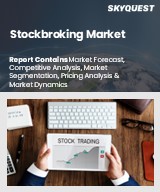
Report ID: SQMIG40D2028
Skyquest Technology's expert advisors have carried out comprehensive research on the stockbroking market to identify the major global and regional market trends and growth opportunities for leading players and new entrants in this market. The analysis is based on in-depth primary and secondary research to understand the major market drivers and restraints shaping the future development and growth of the industry.
Rising Retail Investor Participation
Expansion of Wealth in Emerging Markets
Regulatory Challenges and Compliance Burdens
Rise of Commission-Free Trading Platforms
REQUEST FOR SAMPLE
Global Stockbroking Market size was valued at USD 42.17 Billion in 2023 and is poised to grow from USD 48.26 Billion in 2024 to USD 146.31 Billion by 2032, growing at a CAGR of 12.10% in the forecast period (2025-2032).
The international stockbroking industry is going through a profound change, with technological innovations and strategic realignments of the major players at the center. Electronic market-makers such as Citadel Securities and Jane Street are venturing into bonds and commodities from the conventional equities with advanced IT infrastructures and analytics to garner greater institutional trading shares. Citadel Securities, for example, now processes almost a quarter of U.S. equity trades and is aggressively hiring experienced bankers to bolster its institutional client business. JPMorgan and Morgan Stanley, the big traditional banks, are responding by stepping up their tech spending in order to remain competitive, although smaller institutions might find it harder to keep up. At the same time, in retail, companies such as Zerodha and Upstox in India shook up the sector with zero-commission business models and mobile-only platforms, which forced traditional brokers to rethink pricing and digital offerings. Further, companies such as CMC Markets are incorporating blockchain technologies and offering tokenized assets to diversify their product mixes. These initiatives highlight a competitive environment where the ability to remain agile, lead technological innovation, and diversify strategically is needed to succeed. 'Axis Direct', 'Angel One Limited', 'Upstox', 'ZacksTrade', 'Zerodha Broking Ltd.', 'E-Trade', 'ICICI Securities Ltd.', 'NinjaTrader', 'Tridge', 'Myalgomate Technologies LLP', 'Tethys Technology', 'FMR LLC', 'Charles Schwab & Co., Inc.', 'MetaQuotes Ltd', 'InfoReach, Inc.'
Democratization of investment via digital channels and mobile-based trading platforms has greatly promoted the activity of retail investors. The reduced barriers to entry, market data real time, and fee-free trades have enabled people to participate in stockbroking. This boosts fees and trading volume-based revenues and hence becomes the key driver for growth for the global stockbroking business.
The stockbroking industry is evolving through an exponential growth in digital transformation, where brokers are increasingly moving to online platforms, mobile apps and a range of AI tools. The growth of digital transformation, now provides investors abundant access to brokers, lower transaction costs as well as improve expected customer service. Increased retail investor use of digital platforms is stimulating innovation and competition in the stockbroking market.
Why is North America Leading Stockbroking Market in 2024?
Want to customize this report? This report can be personalized according to your needs. Our analysts and industry experts will work directly with you to understand your requirements and provide you with customized data in a short amount of time. We offer $1000 worth of FREE customization at the time of purchase.
Feedback From Our Clients

Report ID: SQMIG40D2028
sales@skyquestt.com
USA +1 351-333-4748